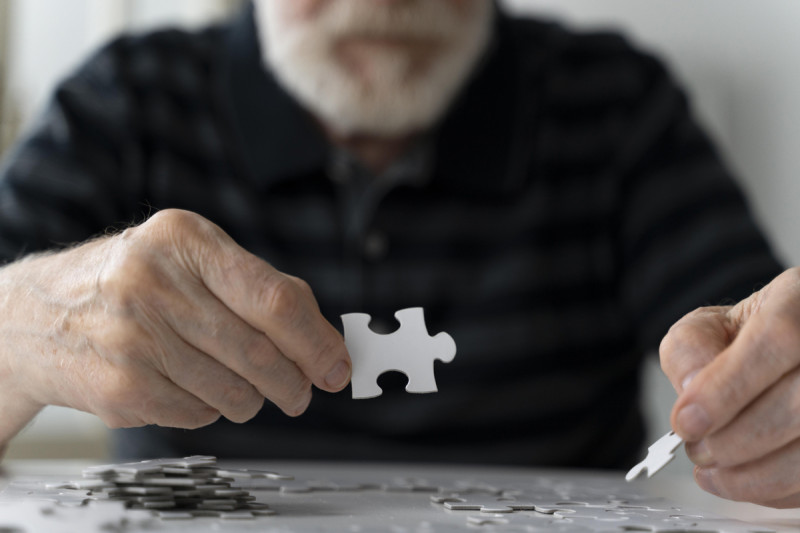
Dementia is defined as the loss of cognitive functioning, such that it affects daily life activities. Dementia is associated with a group of symptoms that impair thinking, memory, reasoning, personality, mood and behaviours.
Dementia is caused by various brain infections or diseases affecting learning, memory, decision making and language abilities. Alzheimer is the most common cause of dementia. Basically, dementia is not a natural result of ageing.
Who are at risk for dementia?
Dementia is more likely to develop in elderly. Dementia is observed in 5%-8% of people aged above 65 and this incidence rate is two times higher after every five years. It is predicted that dementia is present in more than a half of people aged 85 and above.
What are types of dementia?
Dementias are generally divided into two categories; Alzheimer type and non-Alzheimer type.
Alzheimer type dementias are associated with memory loss and speech disorder.
Non-Alzheimer type dementias are manifested by speech disorder and emotional and behavioral problems. In both types, memory loss is relatively minimal at advanced stages.
What is the underlying cause of dementia?
Basically, dementia is secondary to brain disorders and general causes are as follows:
Degenerative neurological disorders like Alzheimer’s diseae, Parkinson’s disease and Huntington disease.
Vascular disorders resulting from multiple strokes
HIV and mad cow disease affecting central nervous system
Prolonged drug abuse or alcohol consumption
Depression
Some types of hydrocephalus, developmental anomalies in the brain, infections, injuries or fluid accumulation caused by brain tumor
What are symptoms of dementia?
Forgetting the recent events or knowledge
Repeating comments or questions within a very short time
Misplacing commonly used objects
Inability to remember dates and times
Difficulty founding correct words
Change in mood, behavior or fields of interest
Signs that indicate progression of dementia
Reduced ability to remember and make decision
Difficulty speaking and founding correct words
Daily life activities such as brushing teeth, making coffee, switching on the television, cooking and paying bills become difficult
Reasoning and ability to solve problem decrease
Sleep pattern changes
Anxiety, confusion, frustration, depression
Hallunications (seeing nonexistent people or objects)
How is dementia diagnosed?
Verification of diagnosis of dementia may be difficult as its symptoms are similar to many other conditions. However, doctors are able to make diagnosis through investigating personal history, current symptoms, neurological and cognitive tests, laboratory tests and imaging studies (CT, MRI, PET) and making relevant examinations.
Can dementia be treated?
For almost all types of dementia, drugs and supportive therapies are available to manage symptoms.
Can dementia be Prevented?
Even if dementia cannot be prevented, maintaining a healthy life can reduce risk factors for some types of dementia. Controlling cholesterol, maintaining normal blood pressure, monitoring blood glucose, maintaining ideal body weight-being healthy as much as possible- can support the brain with oxygen and nutrients at maximum level.
When should you visit your doctor?
Please consult your doctor if you or your family members notice the below mentioned changes:
Alteration in memory
Abnormal cognitive functioning
Inability to perform daily life activities
Personal changes
The In Vitro Fertilization implies fertilizing a human oocyte with a human sperm at the laboratory settings and transferring the resultant embryo into the womb.
The robotic rehabilitation is a treatment modality used to restore the walking ability in patients with total or partial loss of the gait function. The robotic rehabilitation is an evidence-based treatment that also involves virtual reality processes.
All pre-and post-operative procedures of the kidney transplant are extremely crucial for the health of both the recipient and the donor.
The check-up examinations allows treatment of the diseases successfully before the condition progresses to the symptomatic stage, as it ensures early diagnosis of many diseases.
An aesthetic look is important for most women. Certain processes that can cause deformities in women's body can make them feel unhappy and desperate.
Breast cancer is the most common type of cancer in women not only in our country but also worldwide.
As coronavirus (COVID-19) pandemic progresses, scientists teach us more about the virus and how it progresses.